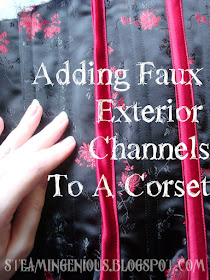In my post about the three most common methods of corset construction, I talked about the pros and cons of using exterior boning channels on your corsets. The main pro, in my opinion, is that they look really nice, especially when made in a contrasting color. The cons are that they are time-consuming and not as durable as some other methods.
There is an alternative to actual exterior channels that gives you the look without the cons: Faux Exterior Channels. Stated simply you create faux channels but simply sewing strips of contrast fabric over your interior channels at the seams. I decided I wanted to do this for my most recent corset, and thought I'd show you how. I experimented with a couple other ways to do this, and found the following method the easiest to get consistent results. This is also very similar to the process for making exterior channels, except I'm not putting bones into these.
1. Cut your fabric strips. I cut on the straight grain for these, since there is no need for extra stretch. It's easiest to do this with a rotary cutter and good ruler. I made these strips 1 1/2" wide. The fabric is satin remnants from a yard sale bridesmaids dress.
2. Fold your strips in half lengthwise with wrong sides together. Pin, but do not press.
3. Stitch the strip into a tube. I stitched about 1/4" from the edge.
4. This is where this technique requires special tools. I use Quilter's Pressing Bars inside the tube to make a nice shape when pressing. You can find them in most sewing stores or Amazon has them: Quilter's Pressing Bars
5. Position this tube, seam down over your bone channel. This corset was constructed with the Folded Seam Method, so the seams with the bones are pretty bulky, creating a nice illusion of external channels. Stitch close to the edge of the tube along one side. I first tried this with a zipper foot, thinking I could get right next to the bone, but it kept slipping off the rounded hump of the bone. I found my standard foot, place on top of the bone worked very well.
Here is the faux channel stitched down on one side only. To the right is a completed faux channel.
6. Stitch down the other side of the channel, making sure it lies taut over the bone.
And you're done! All you have to to is bind the edges of the corset. The only downside to making these little tubes for a faux channel is that if you look closely in the right light you can faintly see the seam line in the middle of the channel.
So why do this instead of making exterior channels? Isn't this adding more work? Maybe. I like the durability of the folded seam and the look of the faux channels. I am most comfortable making a corset from front to back with the folded seam method to get all the layers together correctly, so this was the easiest and fastest way for me to go about it. YMMV.
You can use this same method to make external channels. You will need to use two layers of fabric in your tubes: one strength layer and one fashion layer. So it's a little more work and more fiddly.
Here's the finished corset, though it's not a great picture. I don't have anything proper to lace it onto.











Wow I love the fabric, it looks great :)
ReplyDeleteTHANKS!
DeleteWhen I tried to make external boning channels the corset underneath got wrinkled. How did you avoid that?
ReplyDeleteWell in this case I was stitching these faux channels over channels with bones already in them, so the fabric was already held taut. But in general, I haven't had a problem with external channels causing the corset to wrinkle. I would check your thread tension and needle size choice. It sounds like an issue with thread, needle, or sewing machine to me. Unfortunately I'm not an expert in fixing machine problems.
DeleteCan I use the faux channel just as decor? I have boning, but I want the lines in other non-boned places. What do u suggest, add more boning?
ReplyDelete